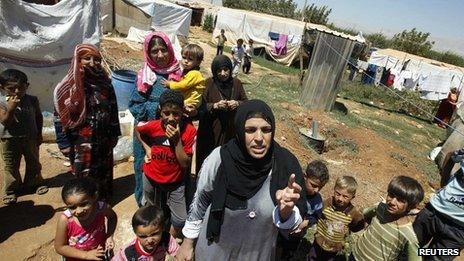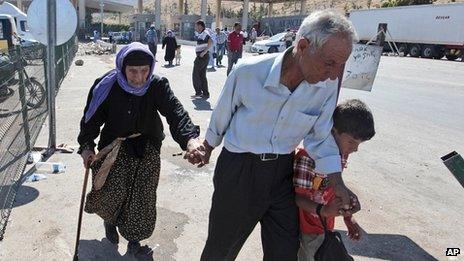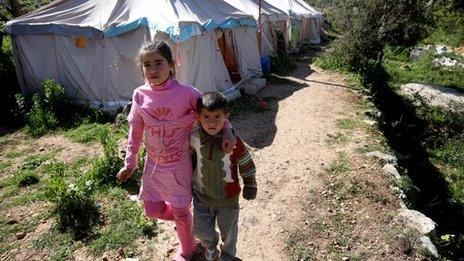Gordon Brown's school plan for Syria's refugees
- Published

A quarter of the children in Lebanon will soon be Syrian refugees
Syria's refugee crisis is threatening to become a long-term education disaster. There will soon be 500,000 refugee children in Lebanon, with few having access to school. But Gordon Brown, former UK prime minister and UN special envoy for global education, says that lessons could be in place in weeks.
"A few days ago, global education campaigner Malala Yousafzai was able to speak over Skype to Zahra and Om Kolhtoum Katou, teenage Syrian twins exiled in Baalbeck in East Lebanon.
As they talked, the three girls realised that they shared something in common. All three are victims of violence that threatened to destroy their youth and their future, and all three cannot do what most other girls and boys do every morning: leave the home in which they grew up and go to school.
Now there is a plan that could help the biggest single group of Syrian child refugees - 300,000 of those exiled to Lebanon - which could see them in school and being fed within weeks.
It has been prepared by Kevin Watkins of the Overseas Development Institute for the charity, A World at School, which campaigns to get an education for the millions of children without access to school.
But this plan can only be put into practice - and this seems unlikely today - if the international community, which is financing just 2% of schooling needs in humanitarian crises, offers an additional $500m (£319m).
The plan involves keeping Lebanese schools open day and night in a double or even triple shift system; hiring Syrian refugees as teachers in Arabic in community colleges; providing school meals to tackle hunger as we tackle illiteracy.
This strategy is also rooted in the realistic presumption that the plight of the Syrian children is more than a short-term emergency: their exile could last years. It has the active support of the Lebanese government, but it is an open question as to whether the world community will put up the funds.
Education emergency
Children are always the most neglected and forgotten victims of conflict. Already deprived of food and shelter, boys and girls are also denied their right to education, condemned to forfeit a childhood that, once lost, can never be re-run or re-lived.

What is the future for this family arriving at the Turkish border this weekend?
The one million Syrian children, who make up half of that country's refugees, are simply the most recent victims of this monumental gap in our global system. They are among 28 million children worldwide now being denied their right to schooling in conflict zones and under broken-down regimes.
Soon small, unstable Lebanon will have absorbed 500,000 Syrian boys and girls. Already in just a few months, the refugees have grown in number to an astonishing 25% of Lebanon's child population.
But today, and for the foreseeable future, there are school places for only a small fraction of them - just 30,000. If they suffer the typical exile of children in conflict they could spend 10 years in camps and without schooling.
The traumas engulfing Syrian children underscores an enduring global failure. One hundred years ago, through support for the Red Cross, the world decided it would meet people's basic health needs, even in theatres of war.
Forty years ago Médecins Sans Frontières established that healthcare should be available across the most dangerous and violent of war zones.
Today, the concept of "Education Without Borders" still remains an unfamiliar idea, a concept yet to be built into our system of humanitarian relief.
Conflict zones
Yet the cost of inaction for young people deprived of an education, destroyed by anger, restlessness, and desperation and sentenced to tents and camps often for years, will haunt us for generations.

Only a small fraction of refugee children currently have school places
Because these millions of young unemployed will become the adult unemployable, and many will graduate not into jobs but into violence.
On 23 September in New York, organisations that have for years fought valiantly to deliver education in emergencies will build on pioneering work by UNICEF, UNHCR, UN Refugees and the Inter-Agency Network for Education in Emergencies (INEE) to bring to life the Education Without Borders initiative for Lebanon's Syrian refugees.
In New York, young people from conflict zones around the world, joined by Malala and backed up by a petition presented to the UN Secretary General, will lead an appeal for funds.
It will show that while we cannot do everything we can do something, that hope can survive even amid horror and that good can yet triumph over the worst evils, even in the most troubled and desperate parts of the world."